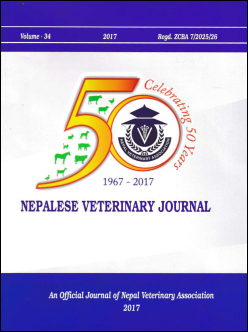Effects of Highly Pathogenic Avian Influenza H5N1 Outbreak in Nepal from Financial and Social Perspectives: A Case Study
DOI:
https://doi.org/10.3126/nvj.v34i0.22861Keywords:
Bio-security, Bird Flu, Economic impacts, Poultry value chain, Small-scale farmersAbstract
The outbreaks of highly pathogenic avian influenza (HPAI) H5N1 have serious public health, economic and social implications. After the first two report of HPAI H5N1 outbreak in Nepal in Jhapa in 2009, a third outbreak was reported in Pokhara the following year where more than 11,000 birds were culled to control the disease. However, the financial and social effects of the Pokhara bird flu outbreak were never assessed. The objectives of this study were to evaluate the local financial and social effects of HPAI H5N1 outbreak in Pokhara and to understand farmers and consumers perceptions on bird flu and the control measures implemented by the government. A total of 200 people including poultry farmers, butchers, veterinary drug dealers, feed suppliers, and consumers were interviewed using the semi-structured questionnaire. The result showed that the direct loss of Pokhara bird flu outbreak from the culling of birds was more than 4.5 million Nepali rupees. The small scale commercial and backyard farmers and the butchers were the most affected from this outbreak. A large proportion of the consumers temporarily stopped to consume chicken meat and shifted to other meat sources. Most of the participants in this study had at least heard about the bird flu. The farmers were unhappy by the compensation provided by the government and perceived that the government control efforts were not satisfactory and were provided little assistance for their rehabilitation. In conclusion, there was a momentary local financial and social effect of the Pokhara bird flu outbreak which may not very important from the macroeconomic point of view but is important for the affected small-scale farmers and the butchers. It is recommended that the government review their policy and provide small scale commercial and backyard farmer a compensation that is closer to the market price and promote largescale poultry farmers to go for insurance.
Downloads
Downloads
Published
How to Cite
Issue
Section
License
© Nepal Veterinary Association




